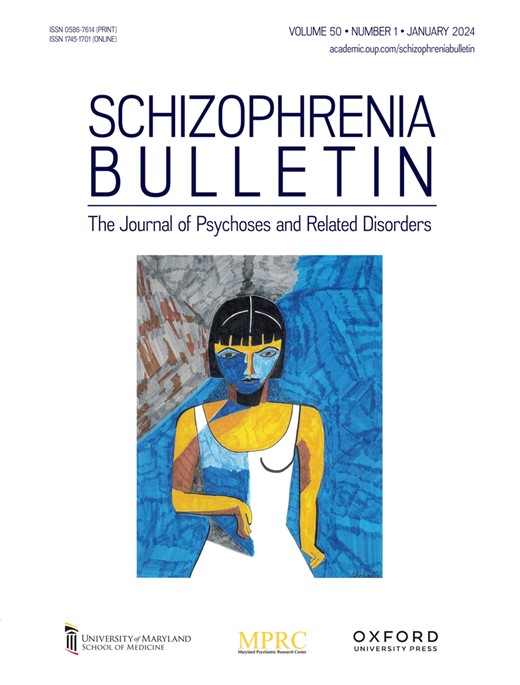免疫激活的精神分裂症患者肠道微生物特征和短链脂肪酸抗炎作用减弱
IF 4.8
1区 医学
Q1 PSYCHIATRY
引用次数: 0
摘要
背景与假设精神分裂症患者(SCZ)的一部分表现为亚临床免疫激活。然而,这一亚群的肠道微生物特征及其与免疫功能的相互作用仍然知之甚少。本研究旨在鉴定免疫激活的SCZ的肠道微生物组特征,并阐明短链脂肪酸(SCFAs)在肠道免疫串扰中的作用。在本研究中,对297例SCZ患者和301名健康对照(hc)进行了4种血清免疫介质的评估。根据这些生物标志物对免疫激活亚组进行分类。通过粪便宏基因组测序、SCFA代谢组学和体外外周血单个核细胞(PBMCs)刺激实验来分析微生物组成、SCFA水平和免疫反应。研究结果我们发现46.5%的SCZ患者表现出免疫激活生物标志物水平升高,这显示出独特的细菌特征。基于微生物组的机器学习分类器在SCZ和免疫激活分类中表现出鲁棒性。值得注意的是,微生物物种丰度、功能宏基因组学和SCFA水平证实了免疫激活患者SCFA生产能力的提高。此外,体外PBMC刺激实验显示,当暴露于脂多糖诱导的炎症时,免疫激活患者的SCFAs的抗炎作用减弱。本研究描述了免疫激活的SCZ患者的肠道微生物群和SCFA代谢谱,揭示了肠道微生物群失调、SCFA生产能力增强和SCFA抗炎作用减弱之间的关联。这些发现为SCZ患者免疫激活的潜在机制和潜在的靶向治疗提供了新的见解。本文章由计算机程序翻译,如有差异,请以英文原文为准。
Distinct Gut Microbial Signatures and Diminished Anti-Inflammatory Effect of Short-Chain Fatty Acids in Schizophrenia With Immune Activation
Background and Hypothesis A subset of patients with schizophrenia (SCZ) exhibit subclinical immune activation. However, the gut microbial features of this subgroup and their interplay with the immune function remain poorly understood. This study aimed to identify the gut microbiome signature of immune-activated SCZ and elucidate the role of short-chain fatty acids (SCFAs) in the gut-immune crosstalk. Study Design In this study, 297 patients with SCZ and 301 healthy controls (HCs) were assessed for 4 serum immune mediators. Immune-activated subgroups were classified based on these biomarkers. Fecal metagenomic sequencing, SCFA metabolomics, and in vitro peripheral blood mononuclear cells (PBMCs) stimulation experiments were performed to analyze the microbial composition, SCFA levels, and immune responses. Study Results We found that 46.5% of the patients with SCZ exhibited elevated immune activation biomarker levels, which displayed unique bacterial signatures. Microbiome-based machine learning classifiers demonstrated robustness in SCZ and immune activation classification. Notably, microbial species abundance, functional metagenomics, and SCFA levels have confirmed an elevated capacity for SCFA production in patients with immune activation. Furthermore, in vitro PBMC stimulation experiments revealed a diminished anti-inflammatory effect of SCFAs in immune-activated patients when exposed to lipopolysaccharide-induced inflammation. Conclusions This study delineates the gut microbiome and SCFA metabolic profiles of immune-activated SCZ patients, revealing an association between gut microbiota dysbiosis, enhanced SCFA production capacity, and diminished anti-inflammatory effect of SCFA. These findings provide new insights into the underlying mechanisms and potential targeted treatments for SCZ patients with immune activation.
求助全文
通过发布文献求助,成功后即可免费获取论文全文。
去求助
来源期刊

Schizophrenia Bulletin
医学-精神病学
CiteScore
11.40
自引率
6.10%
发文量
163
审稿时长
4-8 weeks
期刊介绍:
Schizophrenia Bulletin seeks to review recent developments and empirically based hypotheses regarding the etiology and treatment of schizophrenia. We view the field as broad and deep, and will publish new knowledge ranging from the molecular basis to social and cultural factors. We will give new emphasis to translational reports which simultaneously highlight basic neurobiological mechanisms and clinical manifestations. Some of the Bulletin content is invited as special features or manuscripts organized as a theme by special guest editors. Most pages of the Bulletin are devoted to unsolicited manuscripts of high quality that report original data or where we can provide a special venue for a major study or workshop report. Supplement issues are sometimes provided for manuscripts reporting from a recent conference.
 求助内容:
求助内容: 应助结果提醒方式:
应助结果提醒方式:


